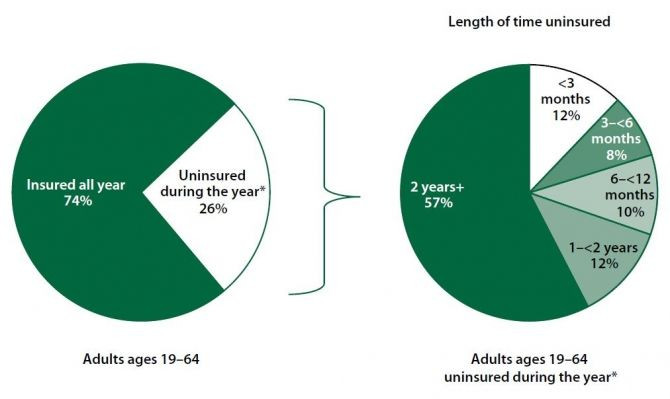A Quarter of U.S. Adults Are Without Health Insurance

More than a quarter of people living in the United States aged 19 to 64 did not have health insurance at some point in 2011 because they lost a job, changed jobs, or were no longer eligible for Medicaid, according to a poll released on Thursday.
The online survey, based on data from 2,134 adults, found that 69 percent of those who lost their insurance went without coverage for a year or longer and more than half were uninsured for at least two years, according to the Commonwealth Fund.
About 41 percent of the people polled had a gap in coverage, lost their employer-sponsored insurance because of changing jobs, losing their job, becoming part-time, because they either could not afford their employer-based insurance plan or because their employer stopped providing health insurance.
About 18 percent of people who were on Medicaid lost their coverage because they earned above the amount needed to qualify or because they didn’t re-enroll in the program when they were supposed to.
Nearly a third of people who lost their insurance reported that they had sought new coverage within the last three years, and were rejected, charged a higher price or were turned down because of their pre-existing medical condition.
About 62 percent said that it was very difficult or impossible to find an affordable policy, and 45 percent of those who lost their employer-based insurance plan said that they never bought a new policy because of cost.
"For people who lose employer-sponsored coverage, the individual market is often the only alternative, but it is a confusing and largely unaffordable option," lead author of the study Commonwealth Fund Vice President Sara Collins, said in a press release. "As a result, people are going a year, two years, or more without health care coverage, and as a result going without needed care."
Researchers reported while people with gaps in coverage are less likely to have regular doctors, get preventive tests, or get cancer screenings.
The survey found that while 92 percent of respondents who had insurance in 2011 had a regular doctor, 83 percent had their blood pressure checked in the last five year, and 57 percent had received a colon cancer screening, only 46 percent of those uninsured for a year or longer had a regular doctor, 51 percent had their blood pressure checked, and only 9 percent had a colon cancer screening.
Study authors said that the Affordable Care Act is already bridging the coverage gaps for young adults due to the new dependent coverage provision that went into effect in 2010, which allowed people up to the age of 26 to join or stay on a parent’s health insurance plan.
Researchers said that the ACA will "narrow if not eliminate" other gaps in coverage, and they noted that starting in 2014, the government will mandate insurers must provide coverage for people with pre-existing conditions or gender, and without extra cost.
The new healthcare act would also expand Medicaid coverage for people with higher incomes than those who are currently covered by the program.
"The current system of health insurance in the United States has gaping holes, the effects of which have become increasingly pronounced during a weak economy," Commonwealth Fund President Karen Davis said in a statement. "The Affordable Care Act is beginning to close those gaps, so that people who are already struggling can maintain health care coverage that will provide for their families' health and help ensure their financial security."



























